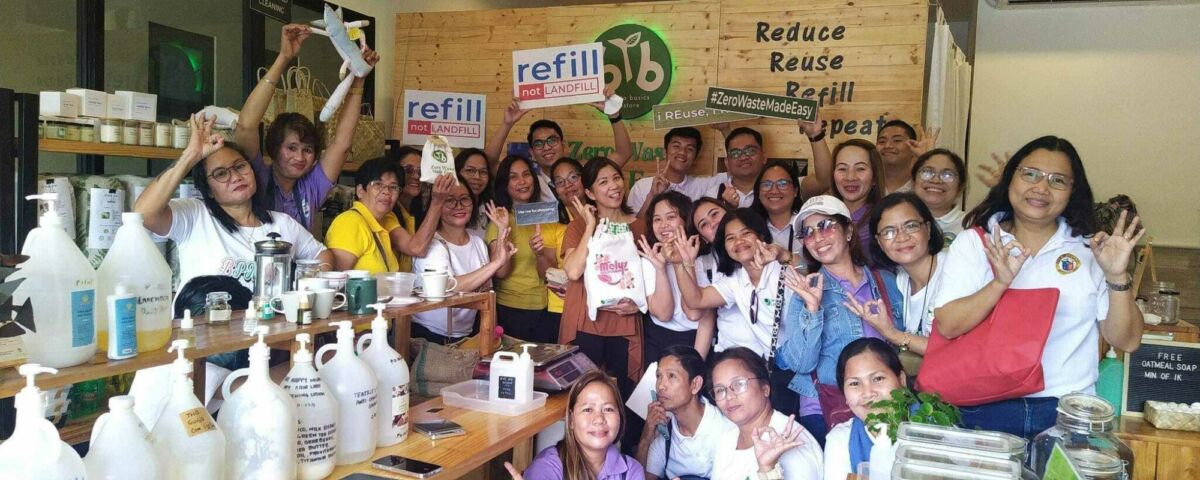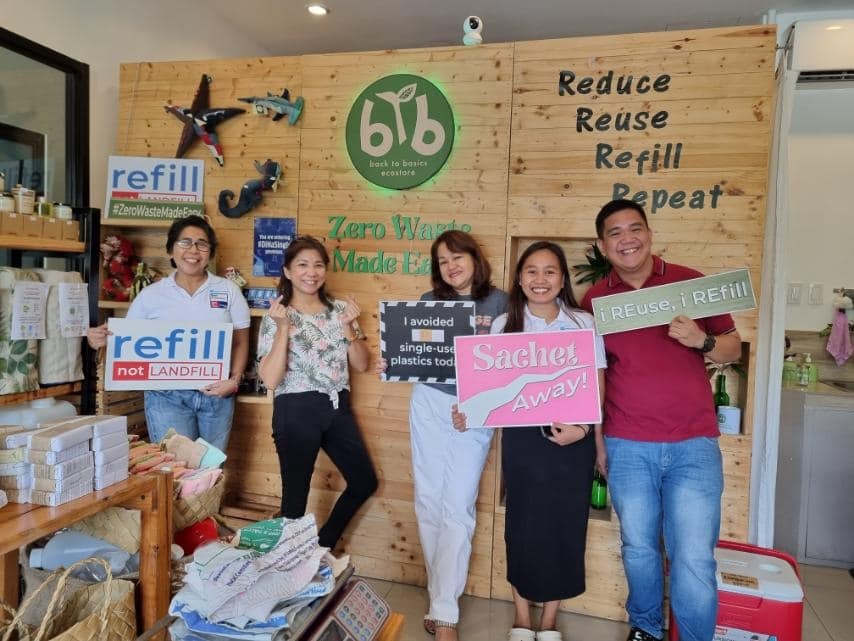





Keep this story going! Share below!
Back to Basics Ecostore’s business is centered around an alternative grocery store that would prioritize sustainability in grocery shopping. Instead of a grocery store lined with products in new packaging, BtB Ecostore is lined with refill hubs of household and personal care products. Customers come into the store bringing their containers, filling them, and leaving with their needed products minus the new packaging. This alternative grocery store promotes reusing old containers, giving them a second life by using them as a container for new products.
The five co-founders/owners, who are Tanya Conlu, Abi Aguilar, Kate Galido, Arnie Cancio, and Lia Esquillo, have decided to incorporate an innovation that would add to their mission of reducing the possible items that can be wasted from grocery shopping. These efforts are part of BtB’s goal to create a circular economy with their suppliers and the business as a retailer. As a retail store, when asked about the innovative sustainable practices that Ms. Cancio would say she is most proud of, she elaborated on the initiative they have been doing regarding their efforts in convincing their product suppliers to take back the eco store’s used containers. This act intends that these containers, called carboys, may be reused by suppliers & customers to promote zero waste.
Additionally, these prevent the carboys from being thrown and therefore recycled. Ms. Cancio emphasized that recycling must be the last option as practitioners of Zero-waste.
“When you practice zero waste, recycling is one of the last options. One of the goals is to reduce the amount of garbage you put into recycling. Not only because you are segregating but because yung mga pwedeng walang kalat or hindi itatapon agad (you are refusing right away the items that can be avoided to convert as trash or items that can prolong its life cycle)”. -Ms. Cancio
This stemmed from the owners being mission-driven, always returning to their mission, reminding themselves and their employees. As Ms. Cancio has shared, they want to fulfill their mission of reducing or removing possible waste when these items can still be reused. Zero waste is then promoted by encouraging the reuse of containers for the suppliers & customers. This serves as an innovation towards any business model as some grocery stores would just place the items a customer would buy in an eco bag, used box, or plastic and not have it required to be returned when they shop again.

Some of the co-founders of Back to Basics Ecostore with an NGO for an event that commenced
Ms. Cancio was a former banker, but she has already developed a burning passion for developmental work since then. She is an active volunteer worker for initiatives or projects related to the environment. The degree of plastic pollution she saw throughout her service made her realize that something in the manner in which we, as a community, consume and deposit waste must change. Hence, she wanted to open a sustainable, eco-friendly grocery store to combat waste. She didn't want to do it alone, so she co-founded it with her friends, who have the same values and sentiments as her regarding living sustainably. Her friends are workers for NGOs related to the environment; they also have the same dream of opening a sustainable store but are unsure how to do it. Fortunately, due to Ms. Cancio's banking background, they collaborated and founded Back to Basic Ecostore, established in 2019. Although setting up a non-conventional grocery store wherein it is more difficult to manage inventories, launching during the pandemic, taking a long overdue time to achieve a return on investment, and starting small compared to its competitors are challenges, they bravely push through despite setbacks because they want to execute their visions and ideals for a better environment. In the interview, she mentioned that "it will take three years for us to recuperate from the overhead expenses and we expect it. We need a good location, parking space, and air conditioning to keep up with competitors."
Standing firm in their vision of being "mission-driven," BtB's most essential impacts so far have taken the form of initiatives to encourage customers, suppliers, and other stakeholders to change their mindsets on the production of waste. Their ultimate impact as a zero-waste natural grocer is to, as Ms. Laarnie puts it: "Be instrumental in normalizing the reuse and refill system in the country."
BtB's initiative to shift to a low-waste supply chain was achieved by convincing their suppliers to do take-backs on empty containers, such as liquid-holding 20-liter carboys and other forms of reusable packaging. They also had to inform suppliers that they preferred not to use bubble wrap and influenced them to find ways to reduce plastic packaging as much as they could when transporting food products.
This initiative not only furthers BtB's mission but also opens food suppliers' eyes to new and different sustainable methods. These methods, with the reuse model at the forefront, could open avenues for more affordable and economical supply chain systems, and it has the potential to change the landscape of grocery supply for the better.
Another waste reduction initiative of BtB is recycling and upcycling efforts. Partnering with UP Diliman's Diliman Environmental Management Office as their official waste aggregator, the BtB team has monthly waste collections where they hand over their waste to the Diliman team for separation.
BtB also spearheads a used oil collection initiative amongst customers, where customers can bring their used oil to the store. Partnering with RMC Oil, BtB then turns over the oil to be recycled into biofuel or even cleaning soap. Regarding any excess paper waste, BtB has partnered with upcycling company Silent Beads, who transform recycled paper into items such as gift tags, which are infused with plant seeds and can be planted.
These partnerships with local businesses and organizations significantly impact society by empowering these businesses and bolstering local sustainability efforts. Through these collaborations, BtB showcases its commitment to environmental responsibility and actively supports and uplifts other local entities that share the same values.
From a business point of view, in terms of profit making, Ms. Laarnie stated that BtB is a risk that she and her co-founders are taking. For customers to see the benefit of their business and encourage them to repeat orders, they would have to make concessions in this aspect of their business.
"We're trying to pass on the benefit, the bulk discount that we get to the customers because again, since we are mission-driven we want to encourage refilling and reuse, and to do that, the customers have to see the benefit— including the benefit to their pocket."
However, with high hopes for the future and increased awareness of sustainability, BtB's innovative and sustainable approach separates it from conventional grocery shops. Their distinct strategy of being an alternative store emphasizing sustainability may stand out firmly in the market, drawing eco-conscious customers and offering the company a competitive edge. Back to Basics Ecostore also strongly believes in sustainability and promoting waste-free consumerism. Customers that share the company's ideals are more inclined to continue shopping. Giving customers a distinctive and eco-friendly shopping experience may enhance repeat business and encourage good word-of-mouth recommendations.
Moreover, BtB's influence on their suppliers to reduce plastic packaging and explore more sustainable transportation methods indicates their ability to drive positive change throughout the supply chain. Suppliers adopting these sustainable practices may lead to cost savings and efficiency improvements for both BtB and the suppliers. This, in turn, can create mutually beneficial partnerships and strengthen the company's overall supply chain resilience.
Furthermore, BtB's low-waste supply chain initiative can have a ripple effect on the entire grocery industry. The company sets a precedent that encourages other grocery stores and suppliers to follow suit by demonstrating the feasibility and benefits of reuse models. As more players adopt sustainable practices, it can lead to an industry-wide shift towards eco-friendly supply chain systems, benefiting the environment and society.
BtB's commitment to sustainability and innovative low-waste supply chain initiative brings multiple business benefits. From attracting eco-conscious customers to forging strong supplier relationships and influencing the industry, the company's approach sets the stage for long-term success while fostering positive change in the grocery supply landscape. As sustainability becomes an ever more critical aspect of doing business, BtB stands poised to thrive in a market that increasingly values ethical and environmentally responsible practices.
This business model's most significant environmental benefit is reducing single-use packaging waste. By encouraging consumers to bring their containers and the business' initiative to return their used containers to suppliers, Ecostore can help decrease the amount of single-use packaging in landfills. This waste reduction directly mitigates the negative impacts on the environment, including pollution and resource depletion.
Additionally, BtB promotes a circular economy with its suppliers. The store creates a closed-loop system for packaging by working with suppliers to take back and reuse the containers. This circular economy model reduces the demand for new packaging materials, conserving natural resources and energy and reducing carbon emissions associated with manufacturing new products.
BtB's waste-reduction initiatives, such as partnering with UP Diliman's Diliman Environmental Management Office for waste segregation and collaborating with local businesses like RMC Oil and Silent Beads for recycling and upcycling efforts, demonstrate their commitment to environmental responsibility and community engagement. These partnerships help tackle waste issues and empower and support local entities that share similar sustainability values. By actively involving the community in these initiatives, BtB fosters a sense of environmental consciousness and responsibility among its customers and beyond.
As BtB continues to grow and advocate for refill and reuse grocery practices, their impact on the environment can be significant. By making low-waste alternatives accessible to Filipinos, the company provides more opportunities for individuals to make environmentally-conscious consumption choices. This shift in consumer behavior, even on a small scale, can eventually lead to substantial positive changes.
In conclusion, BtB's societal and environmental benefits are substantial. By actively promoting sustainability, reducing single-use packaging waste, and collaborating with local partners for recycling and upcycling efforts, the business sets an example for other companies and contributes to building a more environmentally conscious and responsible society. As BtB continues its mission-driven journey, its efforts have the potential to create a profound and positive impact on the environment and society, paving the way for a greener and more sustainable future for all.
Borrowing Ms. Laarnie's words, "The world is finite," and with this understanding, our collective responsibility is to safeguard its finite resources for future generations. BtB's commitment to sustainability and waste reduction proves that businesses can be a force for good and play a vital role in preserving our planet. As we move forward, let us remember that every small action counts and that by supporting businesses like BtB, we can contribute to a brighter and more sustainable future.
Get stories of positive business innovations from around the world delivered right to your inbox.

Back to Basics Ecostore describes the store as an “alternative grocery store that prioritizes sustainability by providing a wide selection of environmentally-friendly products, including those produced by women-led community-based social enterprises.” The store encourages customers to reduce waste by offering refill stations and reuse containers. The company wants people to “reduce the use of single-use plastics and other waste, which ultimately benefits the pocket, the people, and the planet.”